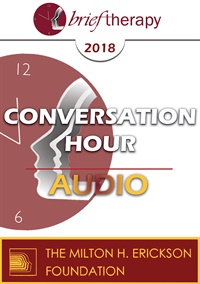
- Average Rating:
- Not yet rated
- Topic Areas:
- Great Conversations | Children and Adolescent Therapy | Family Therapy | Trauma | Brief Therapy | Post-Traumatic Stress Disorder (PTSD)
- Categories:
- Brief Therapy Conference | Brief Therapy Conference 2018
- Faculty:
- Camillo Loriedo, MD, PhD | Lynn Lyons, LICSW
- Duration:
- 1:00:58
- Format:
- Audio Only
- Original Program Date:
- Dec 08, 2018
- Short Description:
- Trauma does not only affect individuals; it effects families. Systemic perspectives on the sequel to trauma will be presented.
- Price:
- $15.00 - Base Price
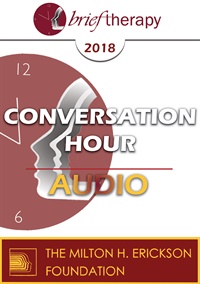
- Average Rating:
- Not yet rated
- Topic Areas:
- Great Conversations | Phobia | Brief Therapy
- Categories:
- Brief Therapy Conference | Brief Therapy Conference 2018
- Faculty:
- Robert Dilts, BA | Jeffrey Zeig, PhD
- Duration:
- 59:18
- Format:
- Audio Only
- Original Program Date:
- Dec 08, 2018
- Short Description:
- Technical and theoretical approaches to working with phobias will be described from complementary perspectives.
- Price:
- $15.00 - Base Price
Tags: Brief Therapy Phobias
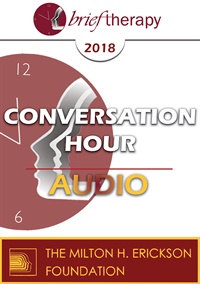
- Average Rating:
- Not yet rated
- Topic Areas:
- Great Conversations | Depression | Brief Therapy
- Categories:
- Brief Therapy Conference | Brief Therapy Conference 2018
- Faculty:
- Judith Beck, PhD | Michele Weiner-Davis, LCSW
- Duration:
- 59:10
- Format:
- Audio Only
- Original Program Date:
- Dec 08, 2018
- Short Description:
- Depression is a complex of psychosocial, biological, and environmental factors. Perspectives on evaluation and treatment will be offered
- Price:
- $15.00 - Base Price
Tags: Brief Therapy Depression
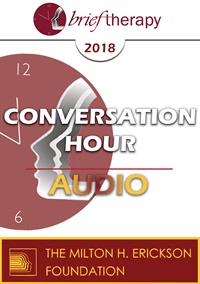
- Average Rating:
- Not yet rated
- Topic Areas:
- Great Conversations | Hypnosis | Mindfulness | Brief Therapy
- Categories:
- Brief Therapy Conference | Brief Therapy Conference 2018
- Faculty:
- Ronald Siegel, PsyD | Michael Yapko, PhD
- Duration:
- 1:00:08
- Format:
- Audio Only
- Original Program Date:
- Dec 08, 2018
- Short Description:
- Compare and contrast mindfulness and hypnosis. Understanding differences and similarities. Indications for using each approach.
- Price:
- $15.00 - Base Price
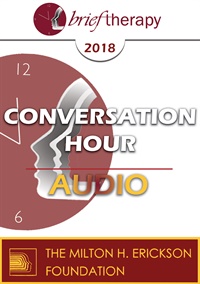
- Average Rating:
- Not yet rated
- Topic Areas:
- Great Conversations | Anxiety | Depression | Research | Training | Brief Therapy
- Categories:
- Brief Therapy Conference | Brief Therapy Conference 2018
- Faculty:
- Stephen Gilligan, PhD | Scott Miller, PhD
- Duration:
- 1:05:12
- Format:
- Audio Only
- Original Program Date:
- Dec 08, 2018
- Short Description:
- Therapists need theoretical and technical constructs, including those that are empirically based. Therapists need to understand how to create a comprehensive treatment plan.
- Price:
- $15.00 - Base Price
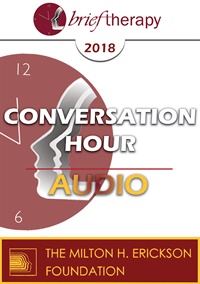
- Average Rating:
- Not yet rated
- Topic Areas:
- Great Conversations | Multicultural | Brief Therapy | Treatment Planning
- Categories:
- Brief Therapy Conference | Brief Therapy Conference 2018
- Faculty:
- Laura Brown, PhD | Elliott Connie, MA, LPC
- Duration:
- 1:05:53
- Format:
- Audio Only
- Original Program Date:
- Dec 08, 2018
- Short Description:
- Contemporary therapist need to understand culturally competent practice. Principles of assessment and treatment will be offered.
- Price:
- $15.00 - Base Price
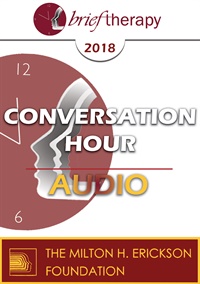
- Average Rating:
- Not yet rated
- Topic Areas:
- Great Conversations | Habits | Brief Therapy | Treatment Planning
- Categories:
- Brief Therapy Conference | Brief Therapy Conference 2018
- Faculty:
- David Burns, MD | Jeffrey Zeig, PhD
- Duration:
- 56:53
- Format:
- Audio Only
- Original Program Date:
- Dec 08, 2018
- Short Description:
- The mechanics of assessment and treatment planning for working with habits and addictions including relevant research findings.
- Price:
- $15.00 - Base Price
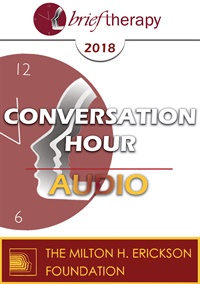
- Average Rating:
- Not yet rated
- Topic Areas:
- Great Conversations | Couples Therapy | Trauma | Brief Therapy | Infidelity
- Categories:
- Brief Therapy Conference | Brief Therapy Conference 2018
- Faculty:
- Janina Fisher, PhD | Stan Tatkin, PsyD, MFT
- Duration:
- 1:02:50
- Format:
- Audio Only
- Original Program Date:
- Dec 08, 2018
- Short Description:
- Trauma in couples includes infidelity, medical illness, and financial issues. Assessment and treatment will be covered.
- Price:
- $15.00 - Base Price
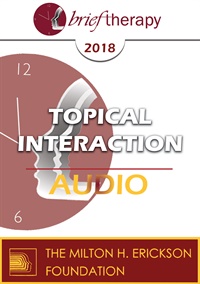
- Average Rating:
- Not yet rated
- Topic Areas:
- Topical Interactions | Brief Therapy | Psychotherapy | Hypnosis | Hypnotic Phenomena
- Categories:
- Brief Therapy Conference | Brief Therapy Conference 2018
- Faculty:
- Michael Yapko, PhD
- Duration:
- 1:00:04
- Format:
- Audio Only
- Original Program Date:
- Dec 08, 2018
- Short Description:
- This presentation will allow for a dialog with attendees regarding the merits of hypnosis, the ways it can be applied clinically, the differences between laboratory and clinical effects on hypnotic responsiveness, and other topics of interest regarding hypnosis.
- Price:
- $15.00 - Base Price
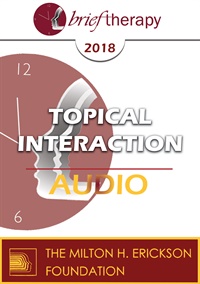
- Average Rating:
- Not yet rated
- Topic Areas:
- Topical Interactions | Couples Therapy | Love | Solution Oriented Approach | Brief Therapy
- Categories:
- Brief Therapy Conference | Brief Therapy Conference 2018
- Faculty:
- Elliott Connie, MA, LPC
- Duration:
- 58:58
- Format:
- Audio Only
- Original Program Date:
- Dec 08, 2018
- Short Description:
- Since the Solution Focused Approach is conversational in nature, and, based on questions, the clinician who is working with couples needs to be comfortable asking these kinds of questions when there are more than one person in the room. This can be tricky due to the nature of couples therapy. This talk will center on how to conduct couples session using this approach and how to use the question process to navigate even the trickiest sessions.
- Price:
- $15.00 - Base Price
Please wait ...

